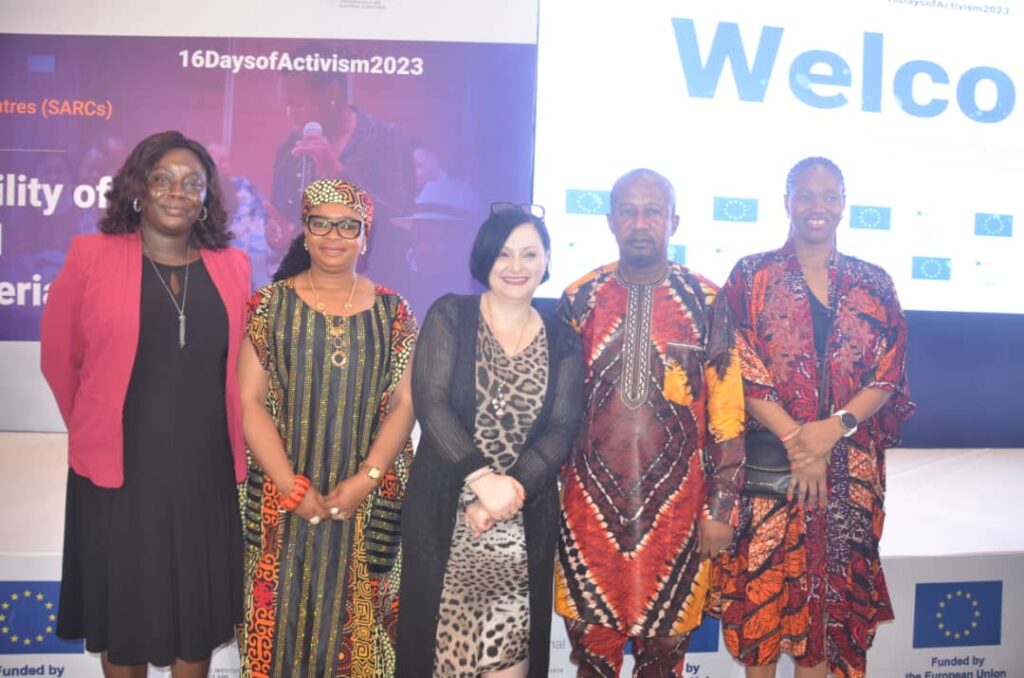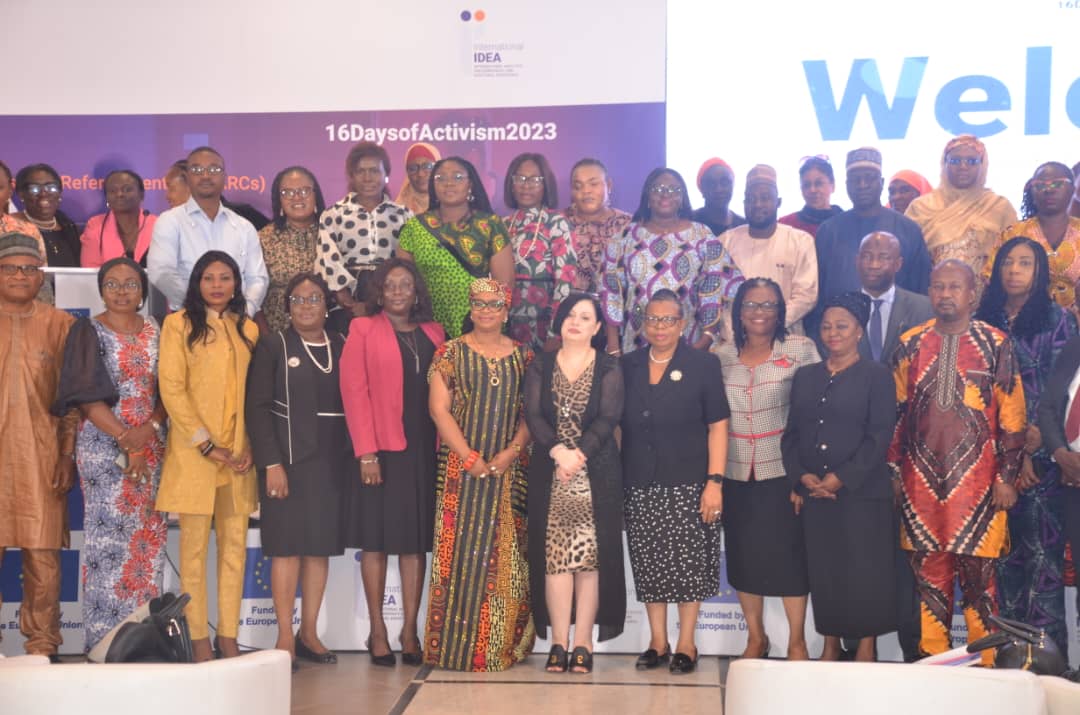*Expends N1bn establishing sexual assault referral centres across Nigeria
Maureen Okpe
The European Union (EU), have lamented the poor funding of the Sexual Assault Referral Centers (SARCs) in the country canvassing for appropriate funding allocations at the federal and state level to maintain operations.
This is even as the trading bloc said it had expended over a billion naira in the establishment of over 41 SARCs) across the country in the last five years in a bid to cub Sexual and Gender Based Violence (SGBV).
The Ambassador and Head of Delegation of the EU to Nigeria and ECOWAS, Amb. Samuela Isopi, disclosed this in Abuja on Wednesday, at the 9th Network Conference of Sexual Assault Referral Centres (SARCs) in commemoration of the 16 Days of Activism Against SGBV 2023, organised by the Rule of Law and Anti-Corruption Programme (RoLAC II), implemented by International IDEA with funding from the European Union.
Isopi assured that the EU is committed to ensuring voices of victims are heard, urging the establishment of specialised courts for sexual and gender-based violence cases
She said, “Sexual and gender violence is the most serious crime affecting women, girls and young boys. Yet, despite the scale of the problem, there are still very few facilities to help survivors, and the number of cases that are extremely limited (less than 1%).
“Providing a safe environment is the first step to break the silence and the stigma that surrounds violence against women. SGBV is not a private issue, it is not a women’s issue. It affects the whole society. That is why it is so important to invest in creating an environment where women and children feel safe and empowered to break the silence.”
“In Nigeria, the European Union has contributed over a billion naira in support of SARCs across the country and we will continue to advocate for more centres and for appropriate funding allocations at federal and state level to make them operational and sustainable.
“SGBV cases require a different approach, they require special protection measures, to improve victims’ experience and confidence in the criminal justice system and reduce the “insensitive treatment” that is often extended to survivors, witnesses and complainants in their pursuit of justice,” she added.
Speaking further, she stressed: “In Nigeria, the European Union has contributed over a billion naira in support of SARCs across the country and we will continue to advocate for more centres and for appropriate funding allocations at federal and state level to make them operational and sustainable.
“Addressing violence against women and girls requires a comprehensive and collective approach. We will continue to collaborate with key stakeholders in supporting legislative instruments”, she said.
In the same vein, the Attorney General of the Federation and Minister of Justice, Mr. Lateef Fagbemi, in his welcome address, reiterated the need for funding for continuity of the SARCs describing it as key factor in the establishment and maintenance of access to justice for victims/survivors.
Represented by Ms. Yewande Gbola-Awopetu Head of the SGBV Response Unit, Federal Ministry of Justice, Fagbemi said, “the sustainability and existence of SARCs is Justice for victims/ survivors of gender-based violence and If our ultimate goal is getting justice for victims of SGBV then we must collaborate and join our collective power to support the active existence of this centres and this we solicit from stakeholders and development partners.
“SARCs therefore needs multi-sectoral support from relevant stakeholders for its smooth operation, its needs support from the State through Budgetary allocations and Human Resources Services such as making available government health workers, social workers, State counsels and other public servants needed by this Centres. It also needs the support of Partners such as the CSOs, NGOs, and Private citizens. This is a collective support service that we must all be interested in and actively participate.

Minister of Women Affairs, Ms. Uju Kennedy-Ohanenye, on her part called for an inclusive 2024 budget for the SARCs to develop a financial road map that will develop a financial road map that will guarantee the continuous existence of the 33 centers.
“As impressive as the efforts of the Federal Government are, the common challenge faced by these centers according to a recent survey is the weak commitment by sub – national governments to strengthen the multi-sectorial and inter-Agency collaboration mechanisms that will sustain the delivery of SARCs services to the victims. The implication is that the Centers lack the requisite funds needed to ensure optimal services delivery.
Kennedy-Ohanenye, represented by Mr. Iheanyichi Amanambu, Assistant Director, Gender Affairs, Women Affairs, pledged the continuous collaboration of the ministry, to mobilize the support of critical Ministries, Departments and Agencies (MDAS) as well as friendly Donors to support the funding and efficient management of SARCs Systems in Nigeria.
Also, Project Manager, Access to Justice and Coordinator, Network of Sexual Assault Referral Centres, RoLAC II of International IDEA, Ms. Oluwatoyosi Giwa, said the SARCs were expected to provide free medical assistance, forensic medical examination, counseling and justice support services to survivors of the act.
Giwa said the objective of the conference is to examine governance issues that continue to limit the impact and sustainability of SARCs in Nigeria and establish clarity on where and how to focus state-level advocacy for funding existing SARCs by state governments.
She said, “We still have a situation where state governments as well as the Federal Government is still not funding largely, SGBV response in Nigeria. And what I mean is that when it comes to emergency rescue, response, shelter services, medical, trauma counseling we still have that significant gap where state government, federal government is still not putting the money where the legislation is. So, all of the different mechanisms that are supposed to respond are there, they are just not properly or adequately funded”.
The International Institute for Democracy and Electoral Assistance (International IDEA) is an intergovernmental organization established in 1995, with 34 Member States. RoLAC II, a $30 million 5-year Programme (2023-2027) funded by the European Union, aims to contribute to the consolidation of Rule of Law and Good Governance reforms in the Federal Republic of Nigeria.
Building on the success of RoLAC Phase I (2017 – 2022), funded by the European Union, the Programme significantly enhanced good governance in Nigeria. It played a pivotal role in strengthening the rule of law and curbing corruption by supporting reform initiatives across federal and state institutions, anti-corruption agencies, civil society, citizens, and the media.

